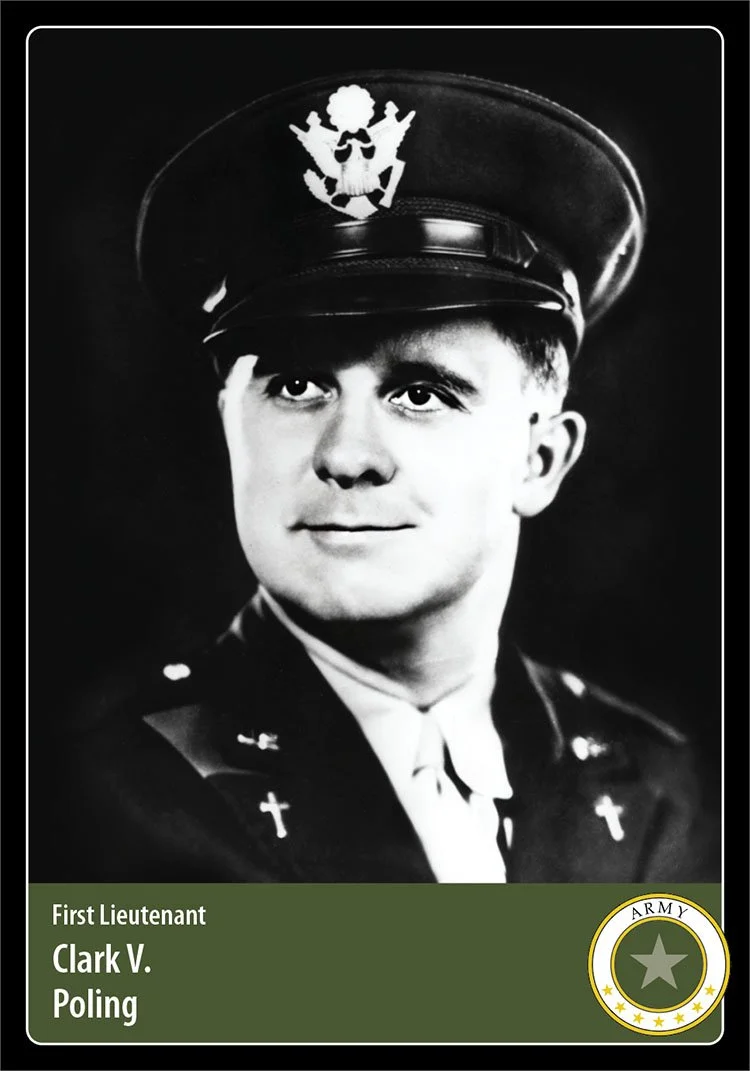Hero Card 114, Card Pack 10
Photo credit: U.S. Army, via Four Chaplains Memorial Foundation (digitally restored)
Hometown: Schenectady, NY
Branch: U.S. Army
Unit: Army Chaplain Corps
Military Honors: Distinguished Service Cross, Chaplain’s Medal for Heroism, Purple Heart
Date of Sacrifice: February 3, 1943 - Labrador Sea, near Greenland
Age: 32
Conflict: World War II, 1939-1945
Clark Vandersall Poling was born in Columbus, Ohio, on August 7, 1910—one of four children. His father, Dr. Daniel A. Poling, was an evangelical minister and well-known Christian author, journalist, and broadcaster. The elder Poling was the editor of the Christian Herald, and president of the Armed Services Chaplains Association.
When Clark was eight years old, his mother Susie died. His father remarried a year later, and the family moved to Auburndale, Massachusetts, where Clark attended Whitney Public School.
With another move to Poughkeepsie, New York, Clark attended Oakwood—a Quaker high school. He excelled as a student and athlete, playing halfback on the school’s football team. He also demonstrated leadership as president of the student body.
Clark Poling’s vocation seemed inevitable. With a heritage of six previous generations of clergymen, Clark too felt the call to ministry. Beginning his undergraduate studies at Hope College in Holland, Michigan, Poling moved to Rutgers University in New Brunswick, New Jersey, and completed his undergraduate degree in 1933. He then enrolled at Yale University’s Divinity School in New Haven, Connecticut, and graduated with a Bachelor of Divinity degree in 1936.
Poling was ordained as a minister in the Reformed Church in America and served a brief student pastorate at the First Church of Christ in New London, Connecticut. In March of 1938, he accepted a call as Pastor of the First Reformed Church in Schenectady, New York. Poling was married to Betty Jung, and in September 1940, the couple welcomed Clark “Corky” Jr. to the family.
After the Japanese attack on the U.S. Naval base at Pearl Harbor, Hawaii, Reverend Poling volunteered as a chaplain—following in his father’s footsteps. Clark enlisted in the Army Chaplain Corps and on June 10, 1942, was assigned to the 131st Quartermaster Truck Regiment at Camp Shelby, Mississippi.
In November 1942, Poling was assigned to the U.S. Army Chaplain School at Harvard University in Cambridge, Massachusetts. He and three classmates would soon become known to the nation as the “Four Chaplains” because of an act of uncommon selflessness and courage.
[NOTE: The following account of events aboard the Dorchester is repeated for each of the Four Chaplains]
German U-boat Attack
On January 23, 1943, the USAT (United States Army Transport) Dorchester left New York harbor, sailing through the North Atlantic into the Labrador Sea. Her destination was the southern tip of Greenland—where the U.S. Army had constructed Narsarsuaq Air Base in 1941.
The base housed as many as 4,000 servicemen who were rotated out on a regular basis due to the harsh weather of Greenland. Narsarsuaq was one link in the Allies’ North Atlantic Ferry Route, in which American aircraft were sent to Europe during World War II.
Disrupting this flow of military assets became a high priority for the Germans. Due to frequent encounters with German U-boat submarines, the dangerous trip to Greenland aboard slow troop transport ships kept American service members on edge until they arrived safely on shore.
Dorchester was part of a convoy, and carried 902 people—soldiers, merchant seamen, and civilian workers. At 12:55 a.m. on the night of February 3, 1943, just 150 miles from their destination, German U-boat U-223 fired three torpedoes at the Dorchester. One exploded into her starboard side. A hundred men were killed instantly.
Dorchester’s electrical systems were destroyed, and she was rapidly taking on water. Panic swept the dying vessel, those not trapped below decks scrambled topside—stunned from the explosion, the frigid darkness, and the blasting arctic winds.
Hans J. Danielsen, the ship’s captain, gave the order to abandon ship. Dorchester would slip beneath the waves of the Atlantic’s icy waters within 20 minutes.
The “Four Chaplains”
Four U.S Army chaplains—all classmates at Harvard—were aboard Dorchester that fateful night: Methodist minister George L. Fox, Rabbi Alexander D. Goode, Dutch Reformed pastor Clark V. Poling, and Catholic priest John P. Washington.
According to the U.S. Army’s account:
Once topside, the chaplains opened a storage locker and began distributing life jackets. It was then that Engineer Grady Clark witnessed an astonishing sight. When there were no more lifejackets in the storage room, the chaplains simultaneously removed theirs and gave them to four frightened young men.
As the ship went down, survivors in nearby rafts could see the four chaplains—arms linked and braced against the slanting deck. Their voices could also be heard offering prayers and singing hymns.
Only 230 of the 902 men aboard Dorchester survived. There weren’t enough life rafts. In the chaos, darkness, and stormy sea, only two of the 14 lifeboats were successfully used in abandoning ship.
Each of the Four Chaplains was posthumously awarded the Distinguished Service Cross for their bravery. Clark V. Poling’s citation reads:
The President of the United States of America, authorized by Act of Congress, July 9, 1918, takes pride in presenting the Distinguished Service Cross (Posthumously) to First Lieutenant (Chaplain) Clark V. Poling (ASN: 0-477425), United States Army, for extraordinary heroism in connection with military operations against an enemy of the United States. On the night of 3 February 1943, the U.S.A.T. Dorchester, a loaded troop transport, was torpedoed without warning by an enemy submarine in the North Atlantic and began to sink rapidly. In the resulting confusion and darkness some men found themselves without life jackets and others became helpless through fear and the dread of plunging into the freezing water. Chaplain Poling with three fellow Chaplains, moved about the deck, heroically and calmly, encouraging the men and assisting them to abandon ship. After the available supply of life jackets was exhausted they gave up their own and remained aboard ship and went down with it, offering words of encouragement and prayers to the last. Chaplain Poling’s great self-sacrifice, personal bravery and zealous devotion to duty exemplifies the highest traditions of the military forces of the United States and reflect great credit upon himself, the Chaplains Corps, and the United States Army.
Tributes
Numerous tributes, memorials, chapels, bridges, magazine articles, and books preserve the story of the Four Chaplains. In 1948, a U.S. postage stamp was issued commemorating their courage. A stained-glass window depicting the four heroes was installed on the third floor, in the A-ring of the Pentagon. The U.S. Congress created a Four Chaplains Medal, which was presented to the chaplains’ families by Secretary of the Army Wilber M. Brucker on January 18, 1961 at Fort Myer, Virginia. By an Act of Congress, February 3 has been designated as Four Chaplains Day.
Listen to the Grateful Nation Project recording of The Four Chaplains’ story on Our American Stories podcast >
Sources
Four Chaplains Memorial Foundation
Traces of War: Poling, Clark V.
The Daily Gazette, February 24, 2018: First Reformed remembers Clark Poling
Military Times, Hall of Valor: Clark V. Poling
U.S. Department of Defense: Video—The Four Chaplains
U.S. Army—Chaplain Corps History: The Four Chaplains
The Saturday Evening Post, Feb. 3, 2022—Heroism in the Face of Hopelessness: The Story of the SS Dorchester
Army Historical Foundation: No Greater Glory: The Four Chaplains and the Sinking of the USAT Dorchester
Military.com: Tragic Loss, Astonishing Heroism Remembered on Anniversary of SS Dorchester's Sinking
Harvard Magazine: The Four Chaplains Are Honored in Memorial Church
Steven T. Collis—The Immortals
Burial Site: Find a Grave





